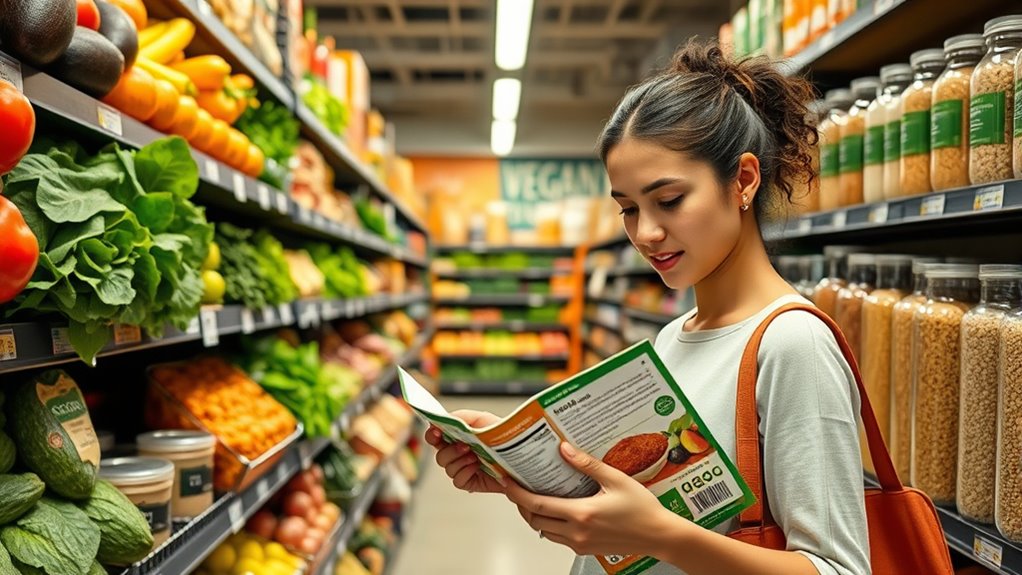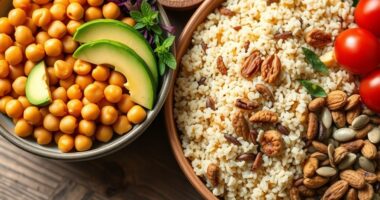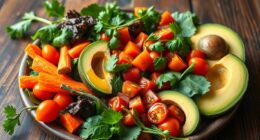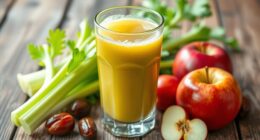To succeed at grocery shopping as a new vegan, focus on carefully checking labels for ingredients like soy, beans, and grains, and avoid items with added sugars or animal-derived products like gelatin and whey. Plan your meals ahead and create shopping lists to stay organized and budget-friendly. Stock your pantry with affordable staples such as lentils, rice, and frozen veggies. Keep these tips in mind — and if you continue exploring, you’ll gain even more confidence in making smart choices.
Key Takeaways
- Always check labels for animal-derived ingredients like gelatin, whey, or casein to ensure products are fully vegan.
- Prioritize staple foods like dried beans, lentils, rice, oats, and seasonal produce for affordable, versatile meals.
- Look for vegan-friendly packaging claims and ingredient lists when shopping for packaged foods.
- Buy in bulk and choose store brands to save money and reduce packaging waste.
- Keep a well-stocked pantry with plant-based proteins and grains to simplify meal prep and maintain a balanced vegan diet.

Starting a vegan lifestyle can feel overwhelming at first, especially when it comes to grocery shopping. You might find yourself staring at unfamiliar labels or unsure which products align with your new diet. To make things easier, focus on reading labels carefully. Look for ingredients like soy, beans, lentils, and whole grains, and avoid products with added sugars or artificial preservatives. Many packaged foods now clearly state if they’re vegan, so take a moment to scan the label for any animal-derived ingredients like gelatin, whey, or casein. This habit helps you stay true to your vegan goals and ensures you’re choosing plant-based options.
Focus on reading labels carefully to identify vegan-friendly ingredients and avoid animal-derived additives.
When you’re grocery shopping, it’s also smart to plan your meals ahead of time. Meal prep can be a game-changer here, as it allows you to organize ingredients and avoid impulse buys. By preparing a weekly menu, you can create a focused shopping list that sticks to your budget and reduces waste. For example, chopping vegetables in advance or cooking grains in bulk saves time during busy weekdays. It also helps you stick to healthy, vegan-friendly meals without feeling overwhelmed by last-minute decisions.
Budget tips are essential when you’re changing to a vegan diet, especially since some specialty products can be pricey. Stick to whole foods like dried beans, lentils, oats, rice, and seasonal produce—these are affordable, versatile, and nutrient-dense. Buying in bulk not only saves money but also cuts down on packaging waste. Look for sales and discounts on staples, and don’t hesitate to buy frozen fruits and vegetables, which are often cheaper and just as nutritious as fresh options. Another tip is to shop local farmers’ markets when possible; they often offer fresh, affordable produce, especially toward the end of the day.
When you’re navigating the aisles, focus on staples that can be combined in numerous ways to keep your meals interesting and cost-effective. Stock up on plant-based proteins like canned chickpeas, black beans, or tofu, which can be used in salads, stir-fries, or wraps. Keep an eye out for store brands and generic labels, which tend to be less expensive but just as good in quality. Remember, grocery shopping for new vegans isn’t about perfection; it’s about making steady, sustainable choices. With a little planning, reading labels carefully, and applying some budget tips, you’ll find yourself confidently building a well-stocked, nourishing vegan pantry.
Frequently Asked Questions
Are All Organic Products Automatically Vegan?
Not all organic products are automatically vegan. Organic certification guarantees that no synthetic chemicals or pesticides are used, but it doesn’t guarantee the absence of animal-derived ingredients or testing. Always check labels for hidden animal products or chemical additives like gelatin or beeswax. Reading labels carefully helps you make sure that the organic product aligns with your vegan lifestyle and avoids any animal exploitation or unnecessary chemical use.
How Can I Identify Hidden Animal Ingredients?
Hidden animal ingredients are like wolves in sheep’s clothing, sneaking past your defenses. To spot them, you should read labels carefully, paying close attention to ingredient lists. Look out for terms like gelatin, casein, whey, and cochineal, which often conceal animal origins. When in doubt, research unfamiliar ingredients online or choose products labeled “vegan” to guarantee nothing animal-derived slips past your watchful eye.
What Are Common Vegan Substitutes for Dairy Products?
You can try dairy-free alternatives like almond milk, soy yogurt, and coconut cheese, which serve as great plant-based substitutes for traditional dairy. These options are widely available in stores and come in various flavors and textures to suit your preferences. By exploring different brands, you’ll find dairy-free alternatives that work for your recipes and snacks, helping you enjoy your vegan lifestyle without sacrificing taste or variety.
Are There Gluten-Free Vegan Options Available?
Did you know that nearly 20% of Americans follow gluten-free diets? Yes, gluten-free vegan options are widely available! You can find gluten-free grains like rice, quinoa, and millet that fit perfectly into your plant-based lifestyle. Plus, there are plenty of vegan snack options, such as fruit and nut bars or veggie chips, making it easy to enjoy variety without gluten. It’s simple to eat well and stay gluten-free!
How Do I Ensure Supplements Are Vegan-Friendly?
To guarantee your supplements are vegan-friendly, look for plant-based labeling and check for reputable supplement certification logos. Always read ingredient lists carefully—avoid gelatin, beeswax, and other animal-derived ingredients. Opt for brands that specialize in vegan supplements, as they often have strict quality standards. By paying attention to labels and certifications, you can confidently choose supplements that align with your vegan lifestyle and avoid any animal products.
Conclusion
As a new vegan, reading labels and finding staples might feel overwhelming, but you’re making a positive change. Did you know that plant-based diets have grown by 300% in the past decade? Keep exploring and experimenting with different products, and you’ll soon discover your favorites. Remember, every small step counts, and over time, shopping becomes easier and more intuitive. Stay curious and confident—your healthy, compassionate lifestyle is worth it!










